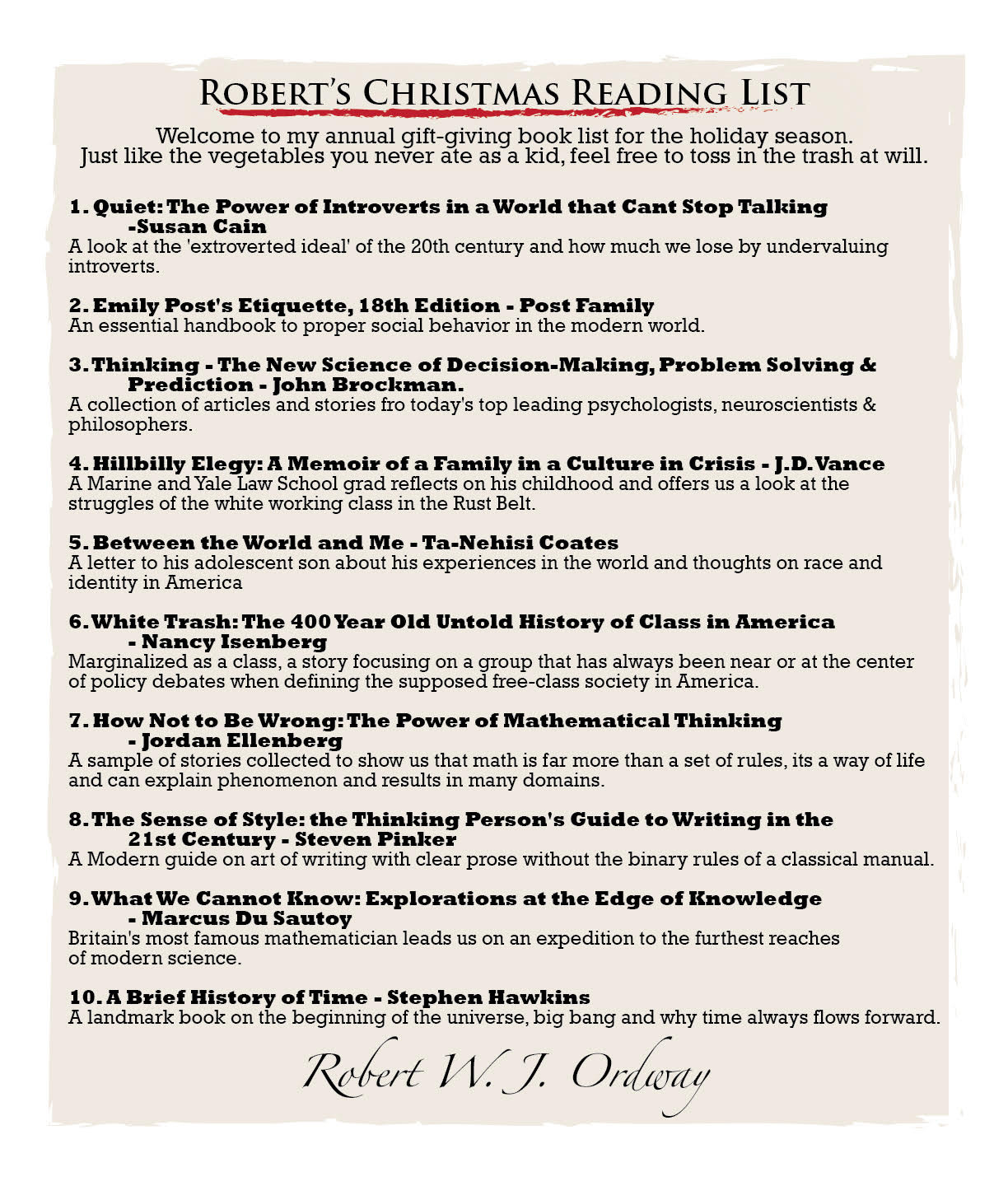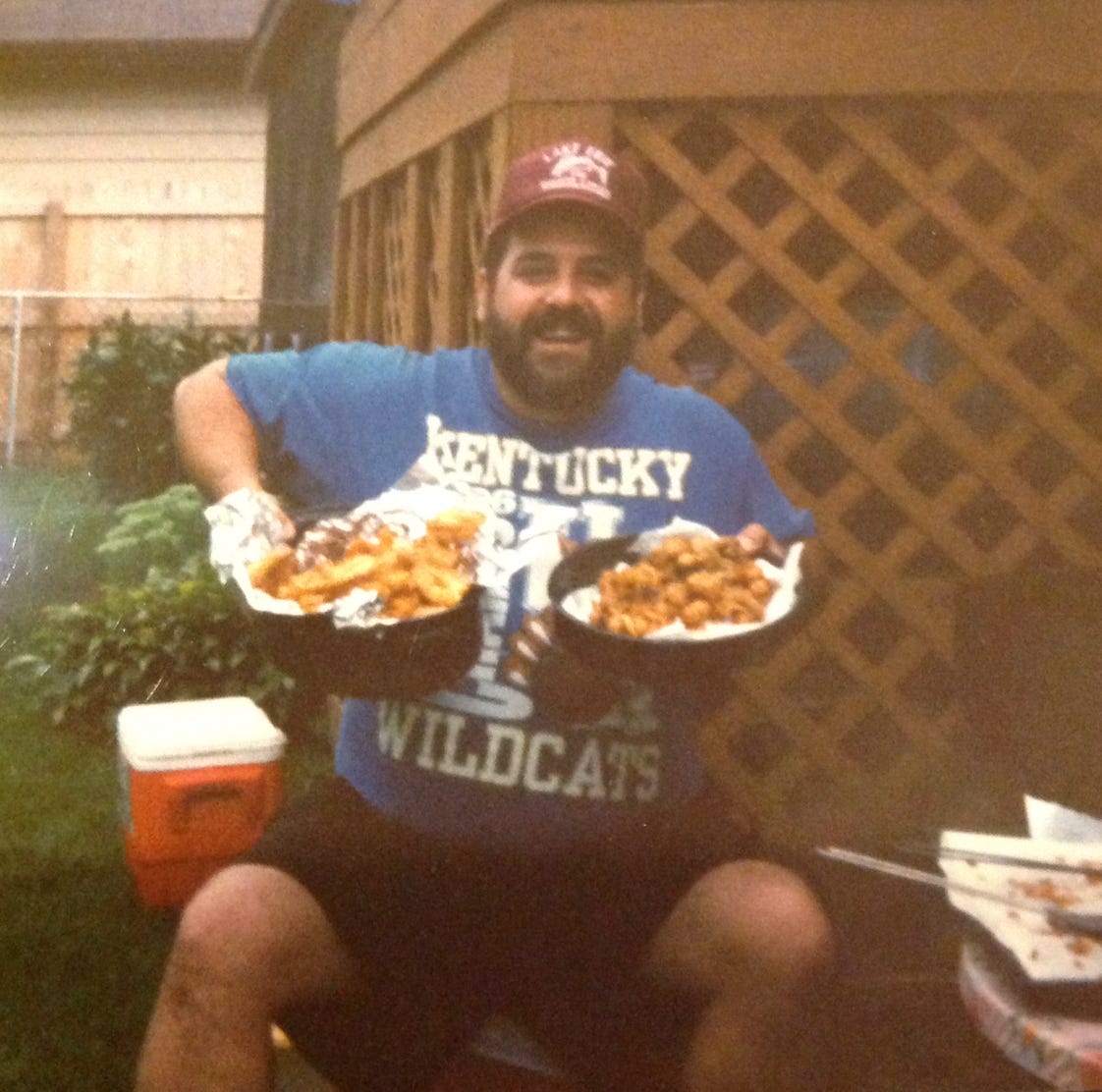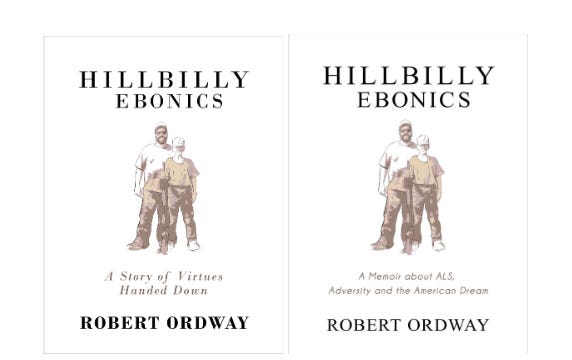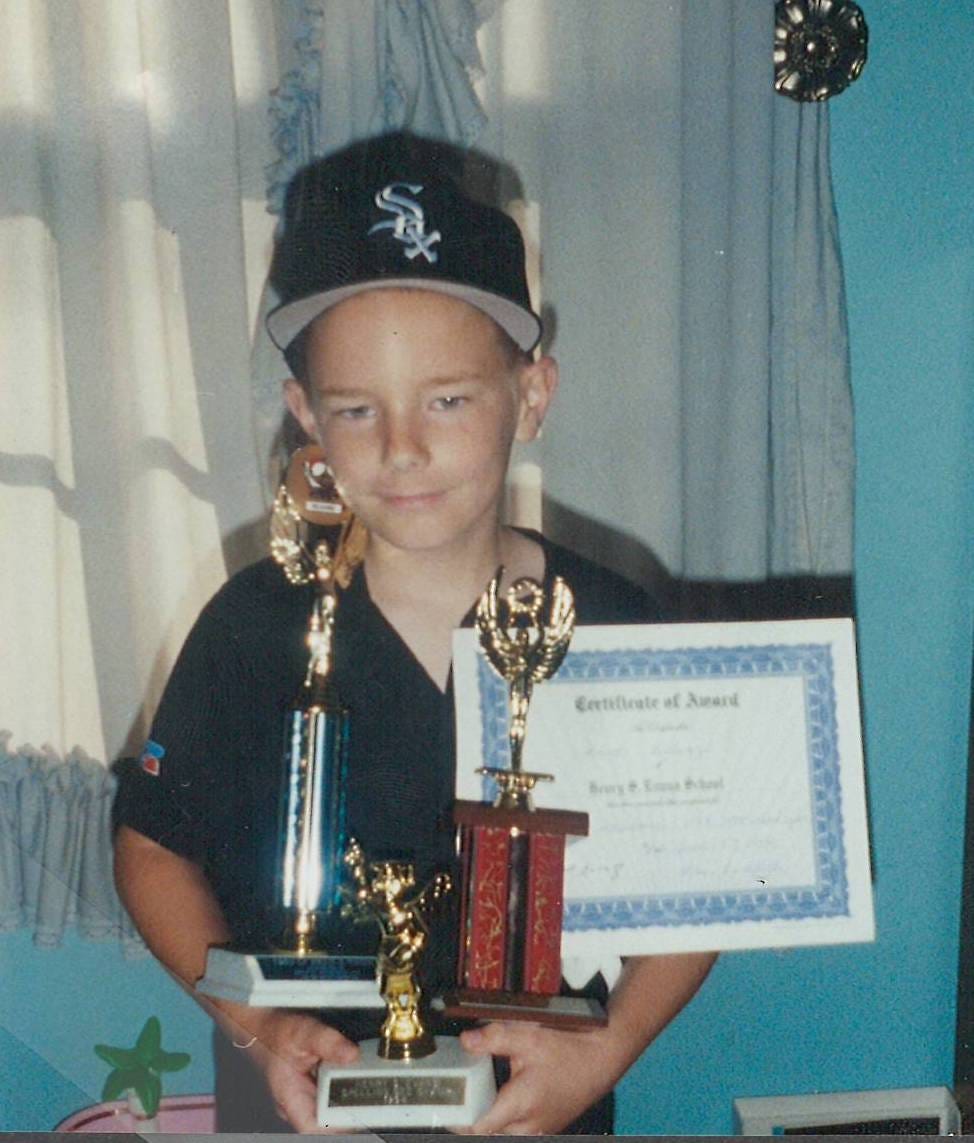The Elder Millennial’s Memoir - Part 1 of 2
A 20 Year Work-In-Progress
Introduction
Coming off an election loss in November 2015 took me all of 24 hours to get over given my ‘why’ but 2016 was one of the hardest years of my life. Between a house fire, engaged in a friend’s defamation lawsuit, the sudden ending of a long-term relationship, an estranged family member, a business in disrepair, and nearly running myself out of money, I was tapped out. That genetic propensity for suicide from mom’s side of the family reared its head for the first time since 2000-2001, when Dad was in full decline from ALS. I knew if I didn’t hit the eject button from the business and the community writ large, something might happen.
There was one glimmer of inspiration that also prompted my abrupt exit from Northwest Indiana, and it was the book Hillbilly Elegy. Author J.D. Vance mentioned things that explained exactly why I wasn’t getting my memoir done after picking at it for the better part of 15 years. In the introduction, he said “... for those of us lucky enough to live the American Dream, the demons of the life we left behind continue to chase us.”
He noted in the conclusion, “For nearly two decades, I suffered from a terrible recurring nightmare.” (related to his childhood trauma). Those two lines explained exactly how I felt and they were a reminder that year after year, time and time again, I picked up the pencil only to put it back down, failing my Dad by not telling his story. Perhaps if I changed my environment, things would be different…
An Introvert Has To Read
I will not belabor the closing of my clothing store, as that is for another time, but I will say working “retail anything” as an owner is not for the weary. As a self-described introvert, I can go hard in the paint working and socializing long hours during the week, but if I don’t get one personal day to myself, I am insufferable to be around: short, cold, and mechanical. Playing weekend warrior as a seasonal salesman at Brooks Brothers and J.Crew from 2009 to 2012 was a fun hobby, but selling clothes for a few hours is very different from running the entire operation. One of my favorite ways to recharge is by reading in solitude, something that wasn’t possible as a business owner.
During the summer of 2016, a few people told me Hillbilly Elegy reminded them of me. Late one Saturday night, after closing the store, I purchased it online along with a slew of other books that were on my mind. My house was still being rebuilt several months after the fire, so I brought the books to the store and set them on the shelf as decorations. Given the demands of the job, it would be mid-October before I became acquainted with Vance’s work, but I also felt compelled to finish Quiet: The Power of Introverts in a World That Can't Stop Talking beforehand.
I ended up reading his entire book in one sitting, marked it up like a textbook, then added it to my 2016 annual Christmas Reading List. It was formatted identically to the one Mitch Daniels published annually during his tenure as Indiana Governor. One part of me was overjoyed that someone might understand my story, and the other was annoyed that his book came out first, given the parallels of our lives and the fact that I had a really big head start. Looking back, I’m glad it took another eight years (all in DC) to refine my thoughts on a few matters.
The Evolution of a Memoir: A 20-year process
Deep in the archives of my iCloud are pieces of writing in various Word documents, dating back to 2004, and they continue to be reworked for this Substack.
I didn’t have a working title at the time, but when I started writing my memoir, the book’s focus was on my Dad’s (then) recent death after his five year battle with Lou Gehrig’s Disease. Having a front seat to witness this decline was so painful to bottle up that I often compared it to a soldier returning from war, internalizing the horrors to protect others, while continually damaging themselves. I thought telling my story would take the place of therapy, since I was “too manly” and unwilling to see a real therapist at the time. With writing, I could solve this all on my own. The problem was (and still is) that every time I put pen to paper to detail those five years, I have lucid nightmares that probably qualify as night terrors.
I did a lot more blogging on my personal life via a MySpace account in 2005-2007 after a five-year romantic relationship ended, and I became estranged from my Mother.
Just two weeks after I finished undergrad in December 2007, it was made known to me that my Dad was not my biological father, the biggest family secret to date. It was a painful fact to process, given how close we were. With this new information and several epiphanies related to my genetic proclivities, the working title of the book became My Three Fathers, and expanded to include my Dad, my biological father, and my Father in heaven, reflecting my growth in faith.
2008 was a brutal year with my newly minted yet near-useless finance degree as this period would eventually be called the Great Recession. I was living in Chicago, trying to figure out why I couldn’t find a job despite three internships on my resume, one at the prestigious firm, Merrill Lynch. Studying the government’s role in housing finance, led me directly into politics. With the election cycle full swing, I read John McCain’s "Faith of My Fathers" and Barack Obama’s "Dreams from My Father," along with "The Audacity of Hope." The personal stories of both men inspired me to keep writing, for myself, of course.
I didn’t fully process the new relationship with my father before Mom committed suicide just a year later in January 2009, three days after I started graduate school. I had no time to deal with the pain, so I buried my head in both school and work. The recession took me back to employment in Gary, Indiana, where I spent a lot of time interacting with the locals, nearly all of whom were black. (see SubStack posts Sammy on the South Shore and Drivin’ for Dee)
Driving back and forth through the city every day caused deep intellectual intrigue. Different pieces started coming together in the next few years after I read nearly every book about Gary and its people. (many listed in my Goodreads) Completing Leadership Northwest Indiana also broadened my horizons about The Region, where a classmate asked me to join the board of the Urban League of Northwest Indiana in 2011. A year later, I became a Silver Life Member of the NAACP Gary Branch. My involvement in local politics led me to become the co-chair of the Valparaiso Republican Party and also a Life Member of the NRA. The "contradiction" of my membership choices is long grounded in civil rights and timeless principles. Note: Like a marriage, I don’t agree with all organizations on all issues.
Through fitness classes at the Valpo YMCA in 2012, I became friends with Jay Weinberg, a Jew from Knox in Starke County, one of the poorest in the state. Our conversations led me to start drawing a parallel between the economic issues affecting both working-class whites and blacks in Gary and beyond.
At that time, I had a deep, unexplainable feeling in my gut. I felt more comfortable in a setting with black Democrats in Gary than I did with affluent white Republicans in Valparaiso. What Jay called hill-bonics I called hillbilly ebonics. It was a cultural connection between whites and blacks that nobody was talking about because segregation, which has both forced and voluntary elements, led us to live parallel lives for so long, despite the many commonalities of those southern migrants now living in the Rust Belt.
Years later, when I read Hillbilly Elegy, this racial connection finally came together and sent me researching down a rabbit hole. J.D. Vance is from Middletown, Ohio, a steel city that to this day is predominantly white, has few black residents and never lost population during deindustrialization but he directly quoted the book, Appalachian Odyssey, “It was not simply that the Appalachian migrants, as rural strangers ‘out of place’ in the city, were upsetting to Midwestern, urban whites. Rather, these migrants disrupted a broad set of assumptions held by northern whites about how white people appeared, spoke, and behaved . . . the disturbing aspect of hillbillies was their racialness. Ostensibly, they were of the same racial order (whites) as those who dominated economic, political, and social power in local and national arenas. But hillbillies shared many regional characteristics with the southern blacks arriving in Detroit.”
Further research into my own family’s 150-year history and migration from western Kentucky to Gary in the 1950s helped explain my Southern Culture of Honor and The Agrarian Tradition, both woven into Dad’s parenting style, which led to a different upbringing than that of my peers – another gut feeling I could never fully explain. Many of my white ethnic friends were fully assimilated into northern consumeristic “whiteness,” but I was a product of western Kentucky through and through, just like dad.
The words, expressions, and values system of my grandparents, along with the black folks in Gary, were too similar – backed up by my lived experience and research. In 2014, my memoir title changed to Hillbilly Ebonics. It was two offensive terms married together (I’m known to try to get a rise out of people for my own entertainment), which upset several of my friends and acquaintances.
Some called my use of Ebonics cultural appropriation or offensive. Still, to those who study history well, the roots of African American Vernacular English (AAVE) are at least partially derived from other “white” cultures. This is covered in the book, Talking Back, Talking Black. I emailed the author, a linguist, a few years ago and felt vindicated:
The problem now was that I had too many big ideas and no idea how to sew them together with a cohesive thesis. The ALS Ice Bucket Challenge of 2014 opened old wounds out of nowhere. Now that ALS finally received the attention and funding it deserved, my book would focus much more on how my Dad lived instead of how he died.
Over the next few years, I became overcommitted to my work, political participation, and nonprofit volunteerism, at one point serving on five boards simultaneously. Adding a new professional development fellowship every year was an additional time suck, so progress on the book was essentially halted because of my inability to say “no” to local community leaders. At some point, you have to average more than 4.5 hours of sleep per night. Once the clothing store became operational in 2015, I stepped away from all my extracurricular activities, yet I was working more than ever before.
Another book entered my life just weeks before Hillbilly Elegy, and it compelled me to look inward and to my past. When Your Best Isn't Good Enough: Breaking Free from Perfectionism helped me understand some of the hardwiring Mom conditioned into me at an early age. That defeated perfectionism was putting me on the exact same path of unhappiness as her, and I didn’t even know it.
As a math guy, the solutions are always logical and binary. Writing, on the other hand, is much more like sculpting clay, and one has to know when to put the carving tools down. Perfectionism has often held me back from moving forward with the book, given its finality. There’s no going back after it’s in print. It’s on the internet FOREVER. Even today, posts like this receive multiple passes from me after being reviewed by my copy editor. (God Bless her!)
Part 2 begins as I promised myself I’d finish the book after moving to DC.
TLDR: After 8 years in Washington, it still didn’t happen…







